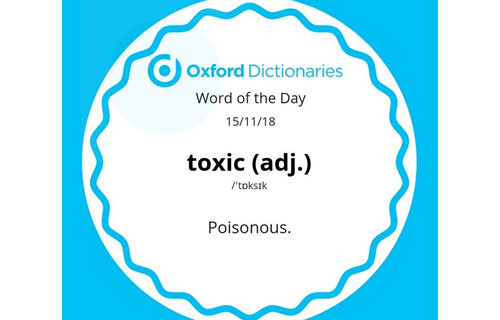据英国媒体上周五报道,《牛津词典》日前宣布,将“有毒”一词选为年度词汇。

Oxford Dictionaries announced that it has chosen "toxic" as its annual "Word of the Year", British media reported Friday.
据英国媒体上周五报道,《牛津词典》日前宣布,将“有毒”一词选为年度词汇。
Defining the word as "poisonous", Oxford said it had become a "descriptor for the year’s most talked about topics", citing the adjective’s use to describe everything from the debate around Brexit to the environment and masculinity.
《牛津词典》表示,“有毒”已成为“今年最热门话题的主题词”,并引用这个形容词来描述从英国退欧辩论到环境和男子气概的一切引申含义。
The dictionary pointed to a 45 percent rise in the number of times the word has been looked up on its website, and said it best captured "the ethos, mood, or preoccupations" of 2018, thanks to "the sheer scope" of its application.
《牛津词典》指出,该词在其官方网站上的搜索次数增加了45%,由于其“广泛的应用”,该词最能精准地体现出2018年的“气质、情绪或关注焦点”。
Toxic has defeated other shortlisted words, such as "big dick energy" and the derogatory term "gammon", to become the word of the year, according to the dictionary.
《牛津词典》称,“有毒”一词击败了其他入围词汇,如“低调态度、随意自信”和贬损词汇“烟熏猪肉”等,成为年度词汇,。
Oxford Dictionaries said that the "Me Too" movement has "put the spotlight on toxic masculinity" whereas in politics more broadly "the word has been applied to the rhetoric, policies, agendas and legacies of leaders and governments around the globe".
《牛津词典》称,“我也是”运动“将公众的注意力集中在了有毒的男子气概上”,而在更广泛的政治领域,“这个词被用来形容某些领导人和政府的花言巧语、政策、议题和政治遗产”。
Oxford’s word of the year is intended to "reflect the passing year in language". In 2017, its Word of the Year was "youthquake", defined as "a significant cultural, political, or social change arising from the actions or influence of young people".
牛津年度词汇旨在“用语言反映过去的一年”。在2017年,它的年度词汇是“青年地震”,定义是“由年轻人的行为或影响引起的重大文化、政治或社会变革”。







